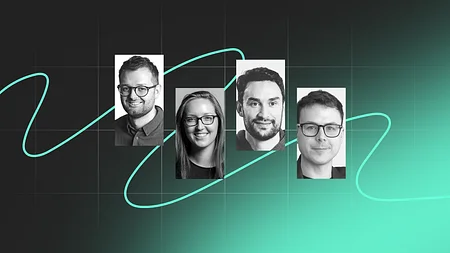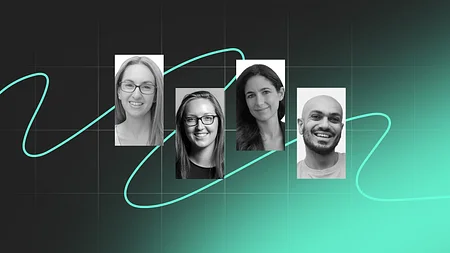After Dark V - London is Calling
I’m recapping the best, brightest, and boldest live show Fintech Insider: After Dark has ever done. Listen back here or stream below as Simon, Ross, and Sarah, are joined by a panel of special guests to tackle the biggest and silliest stories of the week.
Equipped with drinks, guests, party hats, and an enthusiastic audience we’re ready to start the show.
Live at the 11:FS office at WeWork in Aldgate, Simon, Ross, and Sarah kicked off our most ambitious live event ever with After Dark V - London. Over 240 tickets sold and an audience waiting with baited breath, dressed in our latest After Dark swag. Our hosts introduced a brilliant panel of guests, starring: Megan Caywood, Chief Platform Officer at Starling Bank, Liz Lumley, and Richard Davies, Commercial Director at TSB.
Paypal Partnerships
It’s shaking up the market and providing access to financial products and services that people didn’t have before - Ross GallagherKicking things off, Paypal has partnered with Safaricom in Africa. M-Pesa wallet has gone online allowing users to deposit withdraw and transfer money as well as pay with mobile phones. The move means 67% of Kenyan adults are now involved with digital banking, which makes fintech inclusion fan Ross very happy. This new collaboration will allow Safaricom (mobile network provider) customers to seamlessly move money between their M-Pesa and PayPal accounts, opening up global marketplaces to millions of Kenyan businesses and individuals. Equity Bank has dominated the PayPal transactions market in Kenya since 2013 - PayPal users had to look for Equity Bank account holders with PayPal accounts to make a transaction, which has led to the rise of brokers who charged higher commissions. Sarah notes that for the first time people are able to send money quickly cheaply and easily between those telecom operators. It used to be a big problem and now there’s far greater access to money movement. Plus now these people can access the online shopping market. Although, Megan remarks that Paypal is likely doing this as part of a bigger plan, by opening up the Kenyan people to digital economy they’ll be able to engage with global markets for financial services. M-Pesa - PayPal transaction services will now also be available through 148,000 M-Pesa agents versus only 260 or so Equity Bank branches across the country. Follows an announcement by three mobile operators - Airtel, Telkom and Safaricom - that they are set to launch mobile interoperability in Kenya, which will enable customers to transfer money from one mobile wallet to another across networks. Safaricom users will be required to set up PayPal accounts, which they can top up in real-time using their M-Pesa balances. Users can then withdraw funds within a timespan of few hours to three days, depending on the transaction amount. However, Equity Bank does offer higher transaction volumes and has recently introduced a reduced tiered pricing model relative to PayPal (which is fine, as long as you can access an Equity Bank account).
Paypal Slowly Turns Traditional
‘Paypal was the very first challenger that banks were afraid of’ - Liz LumleyPaypal dominates the news this week with another story on their movements in the USA. PayPal has been quietly reaching out to groups of customers in recent months with an offer to add basic banking features to their PayPal digital wallet. Megan comments that people still need banking but they don’t need banks, and that’s what Paypal is essentially offering people with their service. It’s a move we’ve been seeing from the East but haven’t really seen in the US or UK. Paypal cut deals with a Delaware bank to issue debit cards, a Georgia bank to deposit checks instantly after users take a photo of them and banks in Utah to make loans to consumers and small businesses. Bill Ready, PayPal’s chief operating officer, said the company’s goal was to serve users that don’t have bank accounts elsewhere and give them access to the digital economy.
Brexiting the City
It’s expansion, Currencycloud now have two bases, as opposed to one - Sarah KocianskiThere were concerns that Brexit is causing a shortage of software engineers, with some companies opening offices in other European cities to maintain their talent. But really that’s just growth. Companies are expanding to meet their goals by opening offices abroad rather than closing down hubs in London and opening them elsewhere. Investor confidence has not been affected by any Brexit worries, VC investments in 2017 were up 150% on 2016 according to Innovate Finance figures. Richard notices that fintechs have been outsourcing talent from places far removed from the UK for a while, and the UK isn’t just London. For example, Edinburgh has the biggest tech incubator in the country. The problem is not so much people leaving, as a slow down in the influx of talent coming in. Chancellor Philip Hammond’s announcement of various fintech-friendly initiatives at the International Fintech Conference, including the Connect With Work initiative and a separate Fintech Programme through Tech City UK to support early-stage fintechs. A resounding cheer from the audience tells us that no-one thinks that London’s Fintech scene is even close to being out for the count. Although, that one guy whooping at the idea of fintech in London was probably just from Manchester
Murray Bets Big
Has he been advised by a financial advisor that this is a good place to put his money so he doesn’t have to pay as much tax? - Liz LumleyMurray is on the Seedrs’ advisory board and has been since 2015. His recent investments in Investly and Landpay, the Zoopla-backed mortgage marketplace lender, take his investments on the equity crowdfunding platform to more than 30 UK businesses. “I have long been interested in backing companies that offer tech solutions and both Investly and Landbay do that,” Murray said Richard notes that tax schemes like EIS and SEIS are part of what makes London’s fintech scene so attractive to many people including angel investors. Fair play to Andy Murray for putting money into 30 fintechs. We took a quick break to play a game of Celebrity FINtech or NOTtech but you’ll have to listen to the podcast for all the fun. Including some interesting insights on a host of celebrities including R. Kelly...
Millenials Make Wealth Management Needs Clear
Fronted with a millenial-representative photo of a tattooed arm flexing, Accenture released their survey of millennial investing preferences. Digital is key as cutting-edge technology tools are a basic requirement for any investment scenario. Having a human touch is also still necessary, although millennials distrust advisors as only being interested in making money for themselves. 6/10 want to become savvier with cash flow management and budgeting, with 65% citing gamification as a key feature to help. 63% want a mobile platform connected directly to advisors 62% want a platform that incorporates social media 67% want transaction tracking 67% want robo advice as a basic component One size fits all digital experience simply does not work, in our recent Fintech Insiders takeover with Hargreaves Lansdown, Ep. 199 that you can listen to here, we spoke at length about:-
- The need to understand the context behind how customers engage with each channel and going to that level of detail to tailor the experience for customers.
- Also, the need for an ‘analogue safety net’ a seamless transition to phone-based support when the need arises.
Amazon Takes Aim at Teen Targets
It’s hard to talk about this in a non-threatening context - Ross GallagherRelated to their potential checking account product that is in discussion with JP Morgan Chase and Capital One that we’ve talked about on previous shows. It looks like they are going to be targeting teenagers. This is a tactic used by incumbents, get them in young to become a lifetime customer, and to access their payment data via debit card usage. Sarah notes that there’s a touch of the sinister underlying this, with the Amazon MD commenting if you get them in you ‘get their data while they’re young.’ Bloomberg seems to think there’s a financial motivation, that US teens find it hard to get cheap financial services but Wells Fargo and Capital One offer fee free checking accounts with no minimum deposit rates. Sarah did her own research, and Megan backs her up from experience, that it’s very easy to get a checking account in the US. Instead it seems more likely they are going after a provider that teens already know - historically they mostly go with their parents’ bank. Now, thanks to smartphones etc etc ever younger kids have a chance to build loyalty to brands. Richard remarks that with the recent data breaches and the Trump-Amazon war, it might not be the best environment for children to be giving away their sensitive data to companies.
Sweden Fights For Future of Cash
The control of payments all goes into the hands of private banks - Sarah KocianskiSweden is probably the most advanced country when it comes to going cashless. But there are concerns that banks’ actions to drive cashlessness, stopping handling cash in branches, closing ATMs etc, puts all payments in the hands of private banks. By removing the infrastructure that enables cash payments, they are taking control of the payments system away from the central bank, and therefore public control. There are also concerns around having a fully digital system, if it goes off, or someone turns it off, you have no back up. Which of course instantly leads you to think about hacks. Megan comments that she personally wants to be completely cashless but she always wants the choice to have cash if she wants. Most people likely want to have the choice. Nobody wants to be told what to do. Removing cash entirely excludes people who don’t have, or can’t for whatever reason, access digital services. In a recent poll 70% Swedes want to retain some use of cash while 25% wanted total cashlessness. For context, in the UK, 40% of Brits say they can envisage themselves going totally cashless in the future. The argument for public control is that being able to make and receive payments is a collective good, like defence and the courts. There’s an assumption that most citizens would actually feel uncomfortable surrendering these functions to private companies. Our audience was pretty split on the issue, although one half was a touch louder than the other. If the rest of the country is just as split then cash is here to stay for quite a while longer.
Can Cash App Can Cash?
It’s just so useful - Megan CaywoodDubbed “Square’s Venmo Competitor” it’s also the thing that most excited Simon and Ross all year. While the app is still in a basic state, users can make payment to other users and request payments in the UK and that’s all. Sarah notes that it could mean one less step in the payments system process with cashtags enabled the app and if they were synced with geotags you could enter a shop and get a push notification asking if you want to pay with the app.
McAfee Marketing Masterclass
Nothing can match the power of a John McAfee tweet - Simon TaylorJohn McAfee recently revealed that he charges $105,000 for each tweet he sends out promoting digital coins or initial coin offerings (ICO). From his site McAfee defends his actions by saying: “Within the cryptocurrency industry, nothing can match the power of a McAfee tweet.” Each tweet costs $105,000 but divided between his 810,000 followers, the cost per ‘investor’ is only $0.13. It’s up to individual ICOs to decide whether or not that’s worth it. The panel seems less than keen on it. McAfee has interests in smartphone apps, yoga, and all-natural antibiotics. He also ran for US election as a candidate of the Cyber Party, and then re-ran as a Libertarian all in the same election. Simon notes that McAfee has been extremely bullish about bitcoin, writing on Twitter in July 2017 that he predicted that the price of one bitcoin would jump to $500,000 within three years, and "If not, I will eat my own dick on national television". There is an index you can follow online which tells you how likely this is to happen based on the current price of bitcoin. In August 2017, McAfee stepped down as CEO, instead serving as MGT's "chief cybersecurity visionary". In January 2018 he left the company altogether. Both sides stated that the decision was amicable, with McAfee saying that he wanted to spend all of his time on cryptocurrencies, while the company stated that they were getting pressured by potential investors to disassociate themselves from McAfee. He also had a dodgy time in Belize. Suspected drug dealing, murdered neighbors none of which he’s accountable for in the eyes of the law. Thanks to all of our guests on the show, and to everyone who came to watch the show live, we couldn’t do any of it without you. Stay tuned for After Dark V! Listen back to the episode in full here. To ensure you never miss an episode, subscribe to Fintech Insider now! Come talk to us @11FSTeam or @FintechInsiders on Twitter or hello@11fs.com if you want to send us an email.


